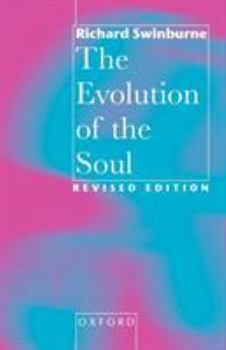Evolution of the Soul
Select Format
Select Condition 
Book Overview
This is a revised and updated version of Swinburne's controversial treatment of the eternal philosophical problem of the relation between mind and body. He argues that we can only make sense of the interaction between the mental and the physical in terms of the soul, and that there is no scientific explanation of the evolution of the soul.
Format:Paperback
Language:English
ISBN:0198236980
ISBN13:9780198236986
Release Date:April 1997
Publisher:OUP Oxford
Length:376 Pages
Weight:1.15 lbs.
Dimensions:0.9" x 5.4" x 8.5"
Customer Reviews
3 ratings
detailed
Published by Thriftbooks.com User , 14 years ago
A very detailed (This is a book that spends 15 pages describing "sensations.")and fairly advanced description of dualism. Most people should be able to understand "The Evolution of the Soul" with some patience. If you are new to the whole naturalism debate, I would recommend, in addition to this book, listening to J.P. Moreland's free MP3s available on the web. His book, "The Recalcitrant Imago Dei" is also a great resource on the subject.
An intriguing book
Published by Thriftbooks.com User , 22 years ago
This is an intriguing book. Oxford Professor of Religion Richard Swinburne defends substance dualism, a philosophically unpopular account of the mind as far as contemporary academic philosophy is concerned. The so-called "mind-body problem" provides the groundwork for this old philosophical argument, once shared by most of humanity before the secular age emerged. Simply put, substance dualism holds that the brain and the mind are separate entities regularly and causally interacting with each other. The brain is a purely physical entity, having a weight, length, width, color, temperature and definite location in physical space, whereas the mind -- taken to mean mental states, such as memories, desires, wishes, hopes, beliefs, and fears -- possesses none of these properties. For instance, you cannot describe your desire to purchase a new car as having the property of being one inch behind your left ear, or being three centimeters in length or weighing four ounces, etc. In short, physical objects can be measured, weighed, and (in most cases) publically observed, whereas mental states can't.In defending substance dualism, Swinburne makes the traditional appeal to Leibniz's Law. Leibniz's Law claims if A is identical with B, then A possesses the same properties as B. For example, suppose a suspected bank robber is apprehended and brought into custody where he's given mug shots which determine that his height is exactly six feet two inches. Suppose also that subsequent to his capture the film from the bank's surveillance cameras are more closely inspected and reveal upon further analysis that the bank robber is considerably shorter than six feet two inches. Thus, it may be concluded that A (the suspect) possessed a property that B (the actual bank robber) didn't -- the property of being considerably taller -- and therefore wasn't the same person who robbed the bank. It is on this basis that Swinburne argues that the mind and the brain are two distinct entities. Yet another property unique to minds is the property of intentionality. Intentionality is the property of aboutness or directedness. Something has intentionality if it's "about" something. Consider a belief. A person never simply "believes"; they believe in something. Say that Paul believes Max is a philosopher. The object of Paul's belief in this case is that Max is a philosopher. Mental states, Swinburne argues, each possess the property of intentionality. Wishes, hopes, memories, fears, and beliefs are each "about" something, whereas the electro-chemical processes which the brain operates under aren't. How, Swinburne asks, can the neurons of the brain be "about" anything in the same way a belief is?Now Swinburne presents one materialist objection to the intentionality argument. Some materialist philosophers (like Dennett) who adopt a monistic account of mind counter that a guided missile is programmed to destroy a target, construed by materialist philosophers as an intentional object. So phys
a major defense of primary mind body dualism
Published by Thriftbooks.com User , 26 years ago
Human beings have evolved from animals, and animals from inanimate matter; but what has evolved is qualitatively different from the inanimate matter from which it began. Both humans and the higher animals have a mental life of sensation, thought, purpose, desire, and belief. Although these mental states in part cause, and are caused by, brain states, they are distinct from them. Richard Swinburne argues that we can only make sense of this interaction by supposing that mental states are states of a soul, a mental substance in interaction with the body. Although both have a rich mental life, human souls, unlike animal souls, are capable of logical thought, have moral beliefs, have free will, and have an internal structure (so that their beliefs and desires are formed largely by other beliefs and desires inhering in the soul). Professor Swinburne concludes that there is no full scientific explanation available for the evolution of the soul, and almost certainly there never will be. For this revised edition Professor Swinburne has taken the opportunity to strengthen and expand his book to take account of developments in this area of philosophy since the first edition. He adds a prolegomenon and seven new appendixes, in addition to minor revisions of the main text. Richard Swinburne has been Nolloth Professor of the Philosophy of the Christian Religion at the University of Oxford, and a Fellow of Oriel College, since 1985. He is a Fellow of the British Academy.





